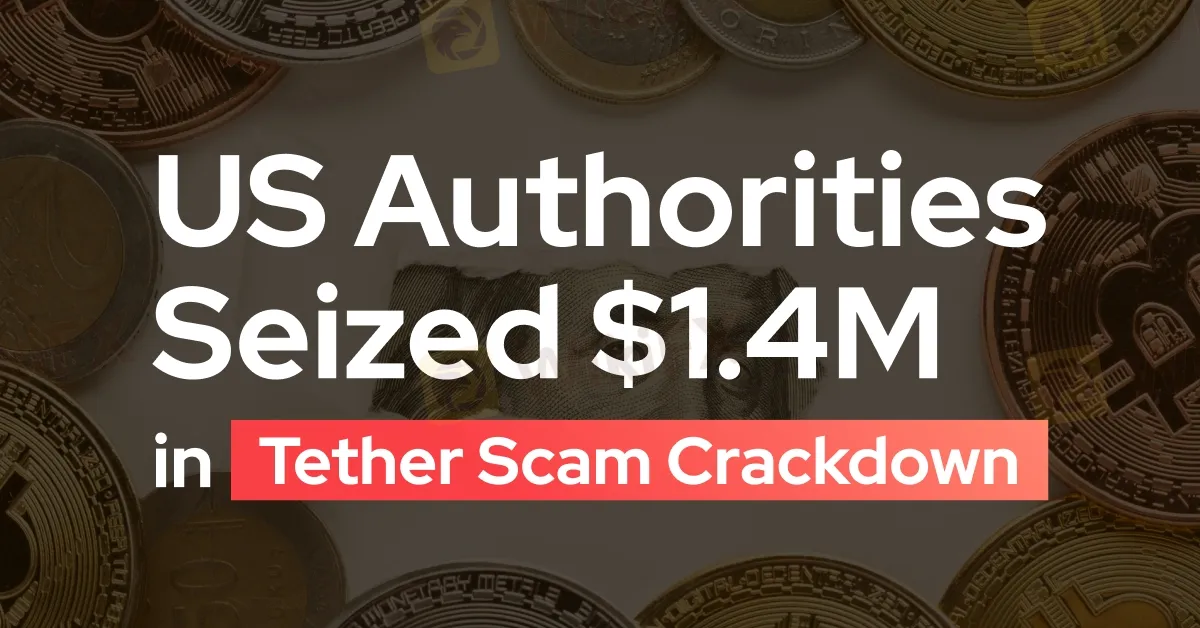简体中文
繁體中文
English
Pусский
日本語
ภาษาไทย
Tiếng Việt
Bahasa Indonesia
Español
हिन्दी
Filippiiniläinen
Français
Deutsch
Português
Türkçe
한국어
العربية
US Authorities Seized $1.4M in Tether Scam Crackdown
Abstract:In a decisive move against digital deception, U.S. authorities have seized $1.4 million in Tether (USDT) as part of a crackdown on a fraudulent customer support operation.

In a significant development, the U.S. Attorneys Office in Chicago, Illinois, has seized approximately $1.4 million in Tether (USDT) as part of a determined effort to dismantle a customer support scam operation. Executed on March 12, this move targeted funds suspected to have been fraudulently obtained, primarily affecting vulnerable elderly individuals.
The operation, spearheaded by the Department of Justice (DOJ) and the Federal Bureau of Investigation (FBI), received cooperation from Tether, a digital currency platform. The scam itself involved deceiving victims through deceptive popup advertisements, falsely asserting that their computers had been compromised.

Upon contacting the provided fake customer support number, victims were further misled into believing their bank accounts were in jeopardy. Subsequently, scammers, posing as support agents, persuaded victims to transfer their bank funds into USDT under the guise of safeguarding their assets, effectively seizing control of the victims tokens.
This case marks one of the initial instances in the United States of successfully retrieving USDT from an unhosted digital currency wallet. While the exact method of recovery remains undisclosed, an affidavit filed on January 24 suggests law enforcement was able to trace the stolen funds to five distinct wallets. These wallets were involved in a wire fraud scheme, with assets moved in small increments through intermediary addresses, likely as an attempt to launder the proceeds.
Despite Tether‘s operations being conducted outside U.S. jurisdiction, American regulators, particularly through the Office of Foreign Assets Control (OFAC), possess mechanisms to influence the stablecoin’s international operations.
A significant regulatory intervention involves Tethers association with Tornado Cash, a cryptocurrency mixer on the Ethereum network, which was sanctioned by OFAC in August 2022 for engaging in money laundering activities. This regulatory action highlights the ability of governmental bodies to indirectly impact tether usage through international cooperation and measures targeting affiliated entities.
Earlier in February, JPMorgan Chase suggested that impending stablecoin regulations could pose challenges for Tether. They argued that such regulations are likely to favour stablecoins offering greater transparency and adherence to emerging Know Your Customer (KYC) and Anti-Money Laundering (AML) standards, potentially affecting Tethers appeal. This regulatory shift could also impact the decentralized finance (DeFi) sector, where USDT plays a crucial role as collateral and liquidity.

Disclaimer:
The views in this article only represent the author's personal views, and do not constitute investment advice on this platform. This platform does not guarantee the accuracy, completeness and timeliness of the information in the article, and will not be liable for any loss caused by the use of or reliance on the information in the article.
Read more

Why More People Are Trading Online Today?
Discover why online trading is booming with tech, AI, and a push for financial freedom. From stocks to crypto, it’s a thrilling hustle for all.

SEC Ends Crypto.com Probe, No Action Taken by Regulator
The SEC has closed its investigation into Crypto.com with no action taken. Crypto.com celebrates regulatory clarity and renewed momentum for the crypto industry.

Interactive Brokers Expands Crypto Trading with Solana, XRP, Cardano, and Dogecoin
Interactive Brokers adds Solana, XRP, Cardano, and Dogecoin to its platform, enabling U.S. and U.K. clients to trade crypto 24/7 with low fees.

Fidelity Investments Explores Stablecoin Innovation in Digital Assets Sector
Fidelity Investments tests a stablecoin, joining major financial firms in the booming crypto sector. Discover how this impacts digital payments and blockchain adoption.
WikiFX Broker
Latest News
Why Are Financial Firms Adopting Stablecoins to Enhance Services and Stability?
Experienced Forex Traders Usually Do This Before Making a Lot of Money
Octa vs XM:Face-Off: A Detailed Comparison
When High Returns Go Wrong: How a Finance Manager Lost RM364,000
Bridging Trust, Exploring Best—WikiEXPO Hong Kong 2025 Wraps Up Spectacularly
Interactive Brokers Expands Crypto Trading with Solana, XRP, Cardano, and Dogecoin
Fidelity Investments Explores Stablecoin Innovation in Digital Assets Sector
Why More People Are Trading Online Today?
SEC Ends Crypto.com Probe, No Action Taken by Regulator
Broker Comparison: FXTM vs XM
Currency Calculator







